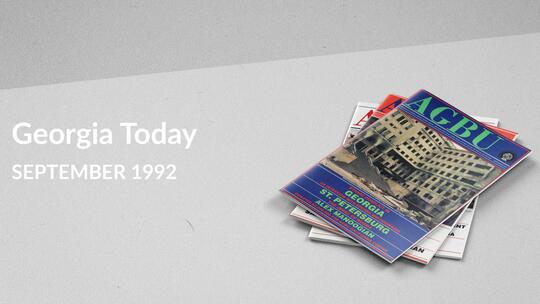by David Zenian
Tbilisi, Georgia— For a country with three ports on the Black Sea, Georgia is as dependent on the goodwill of its neighbors as landlocked Armenia. Stores in downtown Tbilisi, like others in the countryside, are mostly empty. Power outages are as common as in Yerevan, and for the most part, hot water is in the past tense. Unemployment is on the rise, and so is inflation.
"We should be better off than some of our neighbors, but in reality, we are not," says Joseph (Soso) Tsiskarishvili. As chairman of the State Committee of Foreign Economic Relations, Tsiskarishvili is in charge of jump-starting the Georgian economy and attracting hard-currency investments. "Under years of Communist rule, we had no chance to plan anything. We were nothing but an object of manipulation from Moscow," he said in a recent interview.
"It was Moscow's design that Georgia, like all other Republics, be dependent on not only its neighbors, but others, hundreds of miles away. The inter-dependence is unavoidable, but we have to put it on a healthy economic track," he said.
This, Tsiskarishvili is quick to point out, depends on regional politics and Georgia's relations with its neighbors. "Active neutrality is the policy line which Georgia must follow. We cannot take sides in regional conflicts," he said, adding the word "officially" after a brief pause.
"Over the centuries, cooperation between Armenia and Georgia has been a source of strength for both our countries. Some other elements have also come into our relations," he says. Georgia, for example, gets its natural gas and oil from Turkmenia, Russia and Azerbaijan. The pipelines pass through the northern disputed region of Ossetia and the Azerbaijani inhabited Marneouli district of Georgia.
During the month of July, oil and gas supplies were cut off - partly because of the fighting in Ossetia, but also because of Azerbaijani sabotage. "They (the Azeris) blew up the gas pipeline in Marneouli. It was the first time the Armenian-Azeri conflict was played out on Georgian territory," Tsiskarishvili said. "The explosion shut down the flow of gas not only to Armenia, but also Georgia, because we get our supplies from the same pipeline," he said.
When Georgia complained to Azerbaijan, officials in Tbilisi said, the authorities in Baku denied any involvement. "They were quite sarcastic in their reply. They said they were sorry that Georgia was suffering from an anti-Armenian act," said one official who spoke on condition of anonymity.
"The Azerbaijani message was clear... It was a small warning to Tbilisi against taking Armenia's side in the conflict," he said. "All this is leading toward a policy of appeasement. For seventy years we had to say yes to Moscow, now we have to add Baku to the list," the official said with a tone of disgust.
According to government officials, discussions are now underway for the construction of a pipeline from Iran to the Georgian Black sea port of Batumi. There are also suggestions of a highway from India to the second Georgian Black sea port of Poti. Both the pipeline and the highway would cross Azerbaijani territory before entering Georgia, thus underlining Azerbaijan's strategic importance in the projects. "Geopolitics is the key to bilateral relations, and this is why good and friendly relations with all our neighbors are vital for our welfare," Tsiskarishvili says.
But if friendly ties with its neighbors are important, the elimination of internal conflict is paramount to Georgia's economic progress. According to Georgian businessmen and western diplomats, the complications on the home front are proving to be as delicate for Georgia as its relations with its neighbors. Goods arriving at Poti, Batumi and Sukhumi are sometimes vandalized by armed gangs along the way to Tbilisi. On more than one occasion, rail tracks were blown up and rail cars looted.
There are problems at the ports too. Elements critical, or even hostile, to the central government have more clout than anything else. "Poti is the only port which the central government can say it controls, but even that is sometimes meaningless because roads to and from Poti pass through towns and villages whose population is sympathetic to ousted President Zviad Gamsakhurdia," a western diplomat said.
"The word blockade can sometimes take different meanings, especially in Georgia. If it is not from your neighbors, it can be from your fellow countrymen," said a government official.






